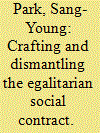| Srl | Item |
| 1 |
ID:
100311


|
|
|
|
|
| Publication |
2010.
|
| Summary/Abstract |
Between the late 1960s and the early 1980s, the Korean developmental state implemented a series of drastic egalitarian educational policies that were primarily geared toward social integration. While promoting social mobility and educational expansion, they provided the basis of the egalitarian social contract in Korea's educational policymaking for decades. Since the 1990s, however, the Korean state has implemented neoliberal education reforms that led to the rapid dismantling of the egalitarian framework for the country's educational policymaking. These neoliberal reforms were strongly supported by the affluent middle class that prefer elitist education and can afford expensive private education. The general direction of change in Korea's educational policymaking suggests both significant change and continuity in the character of the Korean state and its relations to society since the 1990s. The contemporary Korean state still maintains a highly strategic and activist orientation in adopting and implementing policies although its policies are increasingly neoliberal in content. In doing so, the Korean state is gradually abandoning its broad social base and mobilizational capacity, while increasingly connecting with the upper segments of the middle class.
|
|
|
|
|
|
|
|
|
|
|
|
|
|
|
|
| 2 |
ID:
165376


|
|
|
|
|
| Summary/Abstract |
This article offers an analysis of the prominent Egyptian novelist Sonallah Ibrahim’s literary critique of neoliberal Egypt in a selection of his novels: al-Lajna (The Committee, 1981), Dhāt (Self, 1992), and Sharaf (Honor, 1997). It argues that Sonallah Ibrahim makes strategic use of space in his novels as heterotopias of the neoliberal Egyptian state. Heterotopia, here, refers in the Foucauldian sense to a site of deviation, exclusion, and non-normativity that is capable of reflecting the totality of normative order. In Ibrahim’s novels, the heterotopias of the neoliberal state are both narrative and formal. They are spaces in which narrative action takes place as well as specific formal sites in the representational space of the text conveying non-narrative discourse. As such, this article explores the interplay between narrative and representational space in the construction of Sonallah Ibrahim’s critique of the neoliberal Egyptian state.
|
|
|
|
|
|
|
|
|
|
|
|
|
|
|
|
| 3 |
ID:
129838


|
|
|
|
|
| Publication |
2014.
|
| Summary/Abstract |
The strong public support for displays of Maori culture since the mid-1980s in New Zealand under biculturalism appears paradoxical. Cultural values of respect for tradition, community, hierarchy, and attachment to place are promoted abroad and incorporated into public institutions at home at the same time as neoliberal economic policies emphasize individualism, self-reliance, rational behavior, and mobility. This article argues that Maori cultural practices supply the values of communal belonging and solidarity that were previously associated by the public with the New Zealand state. Thus, they support a postmodern conception of national identity and guarantee the legitimacy of the neoliberal state.
|
|
|
|
|
|
|
|
|
|
|
|
|
|
|
|